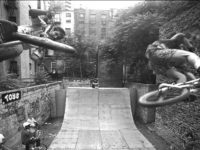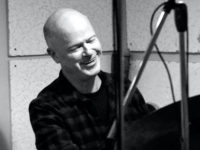Note: Song in video above not on albums discussed in this article.
Whit Dickey, as the liner notes to his latest, Tao Quartets album states, is a well-kept secret who is perhaps a secret too well kept. One of the top drummers in the lower Manhattan free jazz scene since the 80s, Dickey’s contributions to music by David S. Ware, Matthew Shipp, Ivo Perelman and other better-known heroes of improvised music deserve much more appreciation. And as we recently examined with 2017’s Vessel In Orbit, Dickey is a bandleader to be reckoned with, too.
Tao Quartets – Peace Planet and Box of Light attempts to make up for a dearth of precious material under Whit Dickey’s name by him releasing two distinct albums at once. The first disc Peace Planet is performed by Dickey with bass giant William Parker, long-time Downtown alto sax star Rob Brown and Dickey’s own bandleader for two extended stints, pianist Matthew Shipp. Box of Light carries over Brown at alto saxophone but trades Parker for former Matthew Shipp Trio band mate Michael Bisio and Steve Swell on trombone in place of Shipp’s piano.
The Peace Planet quartet in fact is a full reunion of the Matthew Shipp Quartet that recorded one of Shipp’s earliest albums, Points nearly thirty years earlier. Sure, every one of the participants has evolved since then because they are restless artists by nature. That doesn’t mean that the old magic hadn’t returned, however. The titular song is a highbrow exchange of ideas that get processed and integrated into the whole instantaneously. Whit Dickey in particular is playing with more hues than a kaleidoscope, as Brown and Shipp engage in a lively conversation and Parker moves around to somehow stay right in the center of it all. Parker and Dickey form a taut swing section for “Seventh Sun” as Brown and Shipp create harmonic motifs on the fly. Shipp is later going off on one of his knotted excursions that confidently stays on path.
Dickey’s cymbals and tom endeavors on “Ancient Monument” elevate a pretty good performance to a great one. But it’s the grand “Suite For DSW” that shows Dickey at his best. Starting with a de facto duet with Brown, Dickey generates sparks with the saxophonists without ever the need to resort to brute force. As that duet morphs into a trio (everyone BUT Brown), Dickey adjusts his tactics in accordance, his rumble matching the murmur from Shipp. Eventually, all four are improvising in intuitive coordination, with Dickey’s percussion making no distinction between keeping time and adding tonal colors as the leader is directing directional changes discreetly from behind his kit. Finally, Dickey himself gets his own solo moment in the sun and just as you might expect, he does more with less the way Paul Motian and Joe Morello used to. And in the middle part of this performance is Parker all by himself, who just lets the whole song inhabit his bass.
Parker opens “Blossom Time” with a blizzard of notes that points to an amazing dexterity to go along great sense of a song as its being created. The four traverse through barren and then tumultuous terrain before settling into a relaxed swing groove that makes up the most straight-ahead moment of the album.
The very presence of Swell’s trombone supplanting the chordal piano sets Box of Light alight with a fresh assurance that Whit Dickey intended for these two albums to be distinct from each other. Brown’s new sparring partner for “Eye Opener” immediately signals a change in dynamic as the two dance around one another. Bisio’s footprint is lighter but no less lithe and Dickey is once again generating rich chunks of timbre.
“Ellipse: Passage Through” continues with the Brown/Swell sparring match, bolstered by Shipp’s old telepathic rhythm section. Swell blows like a boss when it’s solo time and then Dickey get in his own licks. Bisio is up next, crawling through notes like a animated spider. Bisio’s arco signals a change in strategy for “Ethereality,” but Swell negotiates himself nimbly around Bisio’s saws.
The mood on “Box Of Light” evolves from laid back to itchy, with Whit Dickey setting the ever-shifting tone along the way. Bisio adds some definition to the esoteric melody all while essentially soloing. Brown and Swell trade ideas on “Rotation Steps” but Dickey is very much involved in that conversation, too. Dickey is also in on Bisio’s solo.
On “Jungle Suite,” Dickey and Bisio sound of one unit, which is a little amazing since there’s no discernible timekeeping from them, a benefit of all those years playing together in Shipp’s trio. Halfway through, the commotion comes to a halt as Swell muses over Bisio’s slowly articulated patterns and Brown soon jumps in to take the reins. Whit Dickey — in typical fashion — is right alongside him using his drums not to merely set a rhythmic pulse of the song, but the spiritual pulse, too.
Whit Dickey’s Tao Quartets – Peace Planet/Box of Light goes on sale on July 5, 2019 from AUM Fidelity.
- Claudio Scolari Project – ‘Opera 8’ (2024) - April 25, 2024
- Nick Millevoi – ‘Moon Pulses’ (2024) - April 23, 2024
- Cannonball Adderley – ‘Poppin’ in Paris: Live at L’Olympia 1972′ (2024) - April 20, 2024




